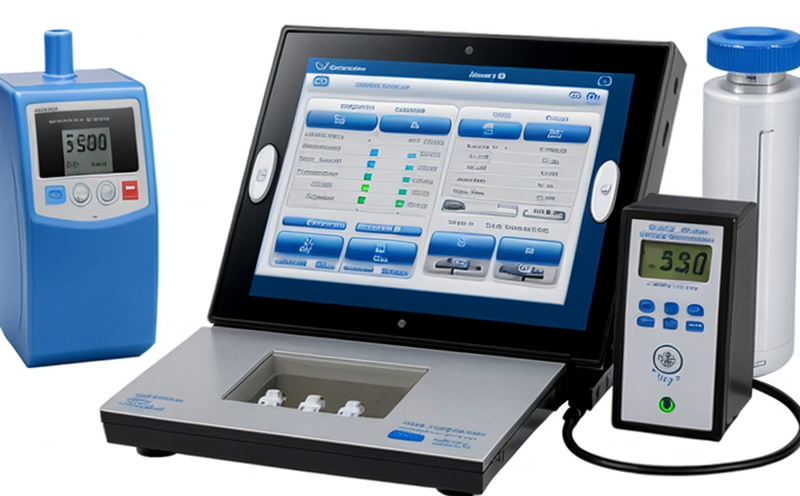ISO 80369-7 Connector Leakage Resistance Testing
The ISO 80369-7 standard is a critical specification in medical device testing, particularly for connectors used in infusion pumps and drug delivery systems. This standard ensures the safety and efficacy of devices that interface with fluids or drugs within the human body. The primary focus of this test is to determine whether the connector maintains its integrity under specified conditions, preventing leakage which could lead to contamination or failure.
The ISO 80369-7 standard specifies a series of tests for connectors used in medical devices that are intended to interface with fluids or drugs within the human body. The most critical test is the Leakage Resistance Test (LRT), which aims to ensure that the connector does not allow any leakage when subjected to pressure and fluid flow. This test is essential because even minimal leaks can lead to contamination of the drug delivery system, potentially causing serious health risks.
The testing process involves subjecting the connector to a specified pressure and fluid flow rate for a set period. During this time, the connector's performance is monitored to ensure that it maintains its integrity without any leakage. The test apparatus used includes a hydraulic or pneumatic system capable of applying the required pressure, along with precise measurement instruments to record the amount of leakage, if any.
The acceptance criteria for this test are stringent and are designed to protect patients from potential harm. According to ISO 80369-7, the connector must not exhibit any detectable leakage under specified conditions. If there is even a trace of leakage, it indicates that the connector may compromise the integrity of the drug delivery system, which could lead to contamination or failure.
For R&D engineers and quality managers working in this sector, understanding these tests is crucial for ensuring compliance with international standards. The test results not only impact the safety of patients but also influence the overall reputation and market success of a medical device manufacturer. Compliance with ISO 80369-7 can lead to increased trust from healthcare providers and consumers, potentially boosting sales and market share.
Let's delve into some real-world examples where this testing is crucial. In an infusion pump system, the connector must maintain its integrity throughout the treatment period, ensuring that no medication leaks out of the system. Failure in this area can lead to under-treatment or over-treatment, both of which are dangerous scenarios for patients.
Similarly, drug delivery systems like insulin pumps rely heavily on connectors to deliver precise doses of medication. Any leakage could result in an incorrect dose being delivered, leading to potential health risks. Therefore, testing these connectors according to ISO 80369-7 is not just a regulatory requirement but also a critical step towards ensuring patient safety and product reliability.
Eurolab Advantages
Eurolab offers unparalleled expertise in medical device testing, with a team of specialists dedicated to ensuring that your products meet the highest international standards. Our state-of-the-art facilities are equipped with the latest technology and instrumentation necessary for conducting ISO 80369-7 connector leakage resistance tests.
- We provide comprehensive test solutions tailored to your specific needs, including detailed reports and analysis.
- Our experienced engineers ensure that every step of the testing process adheres strictly to international standards.
- Eurolab's commitment to quality is reflected in our use of advanced testing equipment capable of delivering precise results.
By choosing Eurolab, you gain access to a team of experts who understand the complexities involved in medical device testing. Our services not only help you comply with international standards but also provide valuable insights that can enhance your product's performance and reliability.
Customer Impact and Satisfaction
The impact of ISO 80369-7 connector leakage resistance testing extends far beyond mere compliance; it directly influences the quality and safety of medical devices. By ensuring that connectors do not exhibit any detectable leakage, this test significantly enhances patient safety, which is paramount in the healthcare industry.
- Enhanced Patient Safety: Ensuring no leakage minimizes the risk of contamination or failure, leading to safer treatments for patients.
- Better Product Reputation: Compliance with international standards can enhance your product's reputation and market success.
- Increased Consumer Trust: Demonstrating commitment to high-quality testing increases consumer trust in your brand.
For quality managers, compliance officers, R&D engineers, and procurement teams, this test is a critical part of the development and manufacturing process. It ensures that each product meets the stringent requirements set by international standards, thereby reducing the risk of recalls or failures post-market.
Satisfying customer expectations is crucial in the medical device industry. By adhering to ISO 80369-7 connector leakage resistance testing, manufacturers can ensure that their products are safe and reliable, leading to higher customer satisfaction and loyalty. This, in turn, can lead to increased market share and profitability.
Competitive Advantage and Market Impact
Compliance with ISO 80369-7 connector leakage resistance testing is not just a regulatory requirement; it provides significant competitive advantages. By ensuring that your products meet the highest international standards, you position yourself as a leader in product safety and reliability.
- Innovation Leadership: Adhering to these stringent tests can drive innovation within your organization, leading to safer and more effective medical devices.
- Customer Trust: Demonstrating commitment to high-quality testing builds trust with healthcare providers and consumers, leading to increased market share.
- Risk Mitigation: By ensuring that no leakage occurs during the connector test, you mitigate the risk of product recalls or failures post-market, saving time and resources.
Competitors who do not comply with these standards may be perceived as less reliable, potentially losing market share to companies that prioritize safety and compliance. In an industry where patient safety is paramount, this can have significant long-term impacts on a company's reputation and success.
The medical device industry is highly regulated, and maintaining compliance with international standards like ISO 80369-7 is crucial for staying competitive. By offering reliable products that meet these stringent requirements, you not only protect patients but also enhance your brand's reputation and market position.





